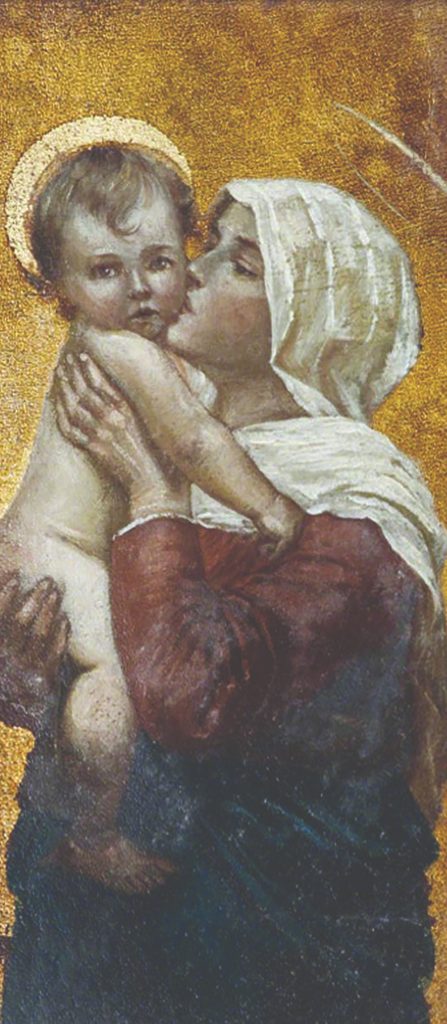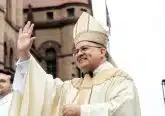A Closer Look: The Things She Carried In Her Heart

In his collection of connected short stories, The Things They Carried, author Tim O’Brien drives the narrative arcs of his characters – American soldiers in the Vietnam War – by listing inventories of the things they carried in their backpacks, pockets, helmets and utility belts. The soldiers don’t talk about the things they carried, rather, the things they carried speak for them. Whether weapons, peculiar supplies, love letters or photographs, we learn many details about the loves, fears, hopes and disappointments of the soldiers solely by the things they carried. When you can carry only a few things, the things you carry tell a story about your life.
While the Bible contains some words of the Blessed Virgin Mary – including the sublime Magnificat – they are relatively few, especially considering that she is the most revered saint in Catholic spiritual life. And, in fact, as important as her few words are, the story of the life of St. Mary might be told even more profoundly by what she carried in her heart.
In the second chapter of the Gospel of Luke, the shepherds who come to worship Jesus tell Mary about the things revealed to them by angels. St. Mary’s reaction was to remain silent. “Mary kept all these things, reflecting on them in her heart.” These mysteries were the things she carried, and they help to tell the story of her life, both as the mother of our Lord and as our own mother.
DEEP CALLS TO DEEP
This is not the only instance in Sacred Scripture where God’s mighty works are associated with quiet consideration. For example, Psalm 46 says in part, “Come and see the works of the Lord, who has done fearsome deeds on earth / Be still and know that I am God.” Through the Psalmist, God tells us that, at least sometimes, the proper mode of worship is silent contemplation. St. Mary exemplifies this mode of worship by pondering the mysteries that had been revealed to her, keeping them in her heart. And as she carried them there, these mysteries must have had a considerable effect on her.
Put another way, the depth of the mystery of God incarnate in Jesus Christ could not be answered other than by the depth of silent contemplation. “Deep calls to deep in the roar of your torrents, and all your waves and breakers sweep over me” (Ps. 42:8). Thus, as God called to the depths of Mary’s immaculate heart, her heart stored that call, allowing it to guide her toward – and through – the profound burdens that lay before her. The depth of the call created deep contemplation, steeling her own moral life and serving as an example to us, her children. Or, as St. Paul says in the Epistle to the Romans, “the Spirit comes to the aid of our weakness; for we do not know how to pray as we ought, but the Spirit itself intercedes with inexpressible groanings.”
A DOCILE WITNESS
By her witness, St. Mary is the perfect example of docility to God’s call. But, of course, to follow the pattern of the Blessed Virgin, we must be willing to be still and listen, to allow deep to call to deep, and to carry these mysteries in our own hearts. In some contexts, “docility” is used as a pejorative, indicating moral laziness or weakness. But as a description of St. Mary, it means quite the opposite. In order to assent to the mystery that God was effecting through her – to be docile – the Blessed Virgin had to have tremendous courage and fortitude. She had to have the capacity for these virtues and the willingness to cultivate them by the mysteries she carried.
In his Epistle to the Philippians, St. Paul said, “God is the one who, for his good purpose, works in you both to desire and to work” (Phil. 2:13). By her docile witness, St. Mary is the example of allowing God to work in us, both to seek and do His will. In other words, by the things she carried, St. Mary teaches us to listen for, store up and reflect upon God’s gracious offer to lead us to Himself.
 Dr. Kenneth Craycraft is an attorney and the James J. Gardner Family Chair of Moral Theology at Mount St. Mary’s Seminary & School of Theology. He holds a Ph.D. in moral theology from Boston College, and a J.D. from Duke University School of Law
Dr. Kenneth Craycraft is an attorney and the James J. Gardner Family Chair of Moral Theology at Mount St. Mary’s Seminary & School of Theology. He holds a Ph.D. in moral theology from Boston College, and a J.D. from Duke University School of Law
This article appeared in the May 2021 edition of The Catholic Telegraph Magazine. For your complimentary subscription, click here.













